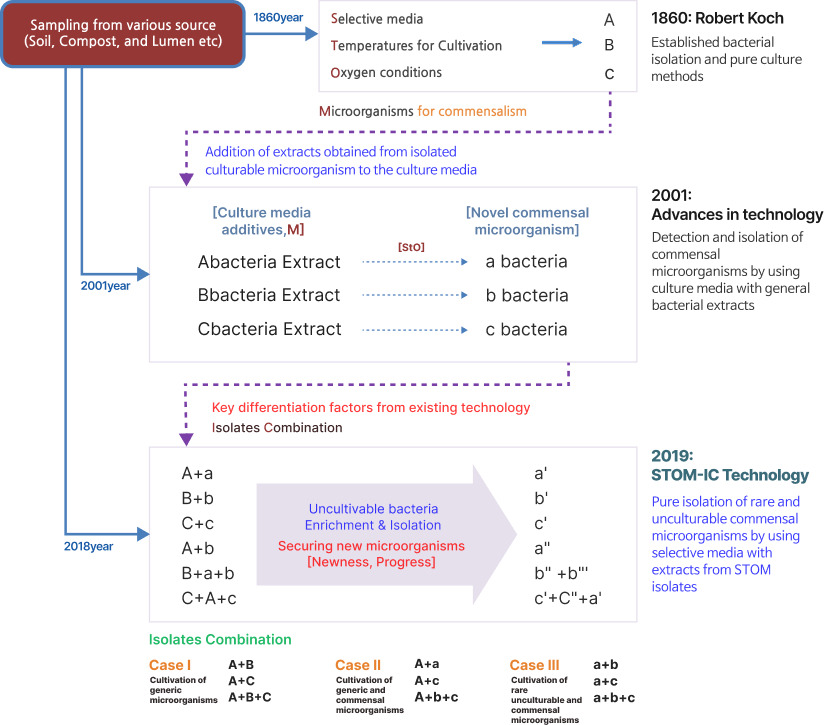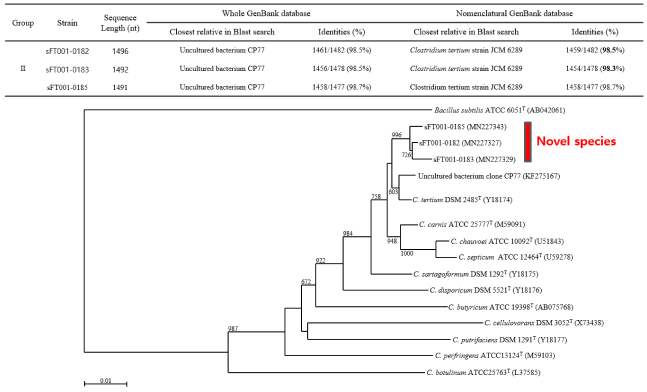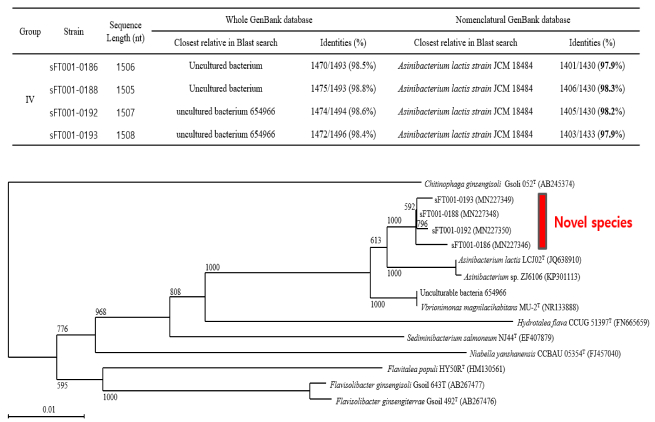Core Technology
Isolation and Cultivation Technology for Unculturable Microorganisms (Altered Traditional Isolation & Cultivation Method)
Selective media, Temperatures, Oxygen tensions, Microorganisms and Isolates Combination for commensalism
STOM-IC is a groundbreaking core technology with significant potential for applications across the microbial industry that enhances the growth of unculturable microorganisms by supplementing synthetic media with extracts from purely isolated microbial species based on conventional microbial isolation and cultivation methods (STOM).
Development background of STOM-IC
STOM+IC
Altered Traditional Isolation & Cultivation Method- The first discovery of bacteria dates back to 1676, when the Dutch scientiest Antoni van Leeuwenhoek invested the first microscope. Since then, various bacterial species have been isolated and identified for the last 350 years globally.
- While numerous techniques have been developed during the last century since 1928, when Alexander Fleming discovered penicillin, current synthetic media-based laboratory culture methods only cover 1-2% of the total microbial species population.
- Such limitation exists as the growth of each microbial species is highly impacted by environmental factors such as temperature, oxygen levels, and pH, as well as other surrounding microbial ecosystems. In particular, most bacteria in nature proliferate as they mutually coexist and share the nutrients and metabolic byproducts with other bacteria or as they compete for survival and die out.
- Future & Tech has successfully developed a technology to purely isolate and cultivate some of the 98-99% “viable but not culturable (VBNC)” microorganisms in nature and named this innovative technology STOM-IC.
Summary of STOM-IC technology
 Figure. Patent No. 10-221035, Isolation and cultivation process for unculturable microorganisms Zoom in to view the image.
Figure. Patent No. 10-221035, Isolation and cultivation process for unculturable microorganisms Zoom in to view the image. - Samples collected from various microbial habitats (including rivers, soil, feces, small intestine, and colon) are inoculated into synthetic culture media and incubated by shaking. The microorganism that grow well in the synthetic media are streaked onto solid media, where single bacterial species are isolated. Multiple isolaton processes are conducted by adjusting the variables, such as media composition, changes in incubation temperature, and oxygen saturation levels, to selectively isolate species that thrive under each set of conditions.
- Microorganisms in multiple natural habitats form complex communities, where they grow and communicate together. Some colonies mutually communicate and support the growth of different colonies.
- These interactions allow unculturable microorganisms, which are hard to grow in synthetic media, to successfully proliferate by the help of generic microbes that are present in the sample.
This is since the metabolites produced by general bacteria can support the growth of unculturable bacteria, or the growth of general bacteria can modify the surrounding environment, which creates conditions essential for the unculturable bacteria to survive and proliferate. - STOM-IC is a technology that induces growth of unculturable microorganisms by adding extracts from purely isolated microbial species, obtained by applying isolation techniques based on conventional microbial isolation and cultivation methods (STOM), to synthetic media.
- By combining extracts from these isolates and adding them to culture media, STOM-IC confirms the growth of previously unculturable microorganisms and their pure isolation and cultivation of novel species.
- In line with the research engaged in by renowned startup ventures and global pharmaceutical companies, STOM-IC is a scalable core technology that can be extended across diverse microbial industries, from the development of microbiome-based therapies to searching for new antibotic hosts.
STOM-IC empirical case studies (Patent No. 10-2201035)
-
1Phylogenic analysis of Group II
unculturable microorganisms isolated from first round culture with bacterial extractsBy adding both extracts fromE. coli and Enterococcus lactis to mammalian duodenum sample culture media, four novel species under genera Clostridium were successfully isolated and cultured, and their 16S rDNA sequences were identified and registered in the NCBI Genbank.
-
Accession number
MN227327, MN227329, MN227343
-
-
Phylogenic analysis of Group IV unculturable microorganisms isolated from culture with bacterial extracts from the first and second culture
By adding both extracts from E. coli and Clostridium tertium to mammalian duodenum sample culture media, four novel Asinibacterium species under genera Asinibacterium were successfully isolated and cultured. These strains were designated asAsinibacterium duodenii , which were donated for preservation to the Korea Collection for Type Cultures (KCTC).
-
KCTC number
KCTC 18773P, KCTC 15835, KCTC 15836, KCTC 15837
-
Cookie notice
By clicking 'Accept all cookies', you agree to the storing of cookies on your device and to the associated processing of data to enhance site navigation, analyse site usage, and assist in our marketing and performance efforts.
Cookie Consent Settings
- Strictly Necessary Cookies
- Functional Cookies
- Marketing/Advertising Cookies
- Statistics Cookies




